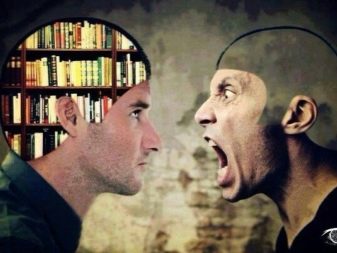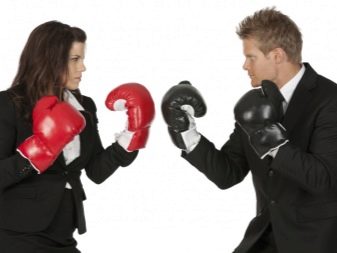Types of conflicting personalities and their characteristics

In everyday life, one has to constantly face conflicting personalities. It is impossible to avoid this: such people are found everywhere and are sometimes completely unpredictable. But still, using psychological knowledge, you can recognize them, divide them into types, and choose the appropriate line of your own behavior.
Peculiarities
Human interaction is not complete without conflict and collision. But not all "clashes" are objective and inevitable. Sometimes their real reason, the decisive factor, is the psychological characteristics of people. There are two fundamental approaches to describing them: one sees collisions as a strictly negative process, and the other sees them as opportunities for moving forward.
Conflict in any case is usually called the probability that a person will enter into an argument, whatever the reason. For the behavior of people, in situations of a particularly tense kind, entering into a conflict is completely normal. Any ordinary person, even the most balanced and calm, can be extremely hostile:
- to life failures;
- disappointment in other people;
- deception;
- various forms of betrayal.


But there are still people of the uncontrollable type, they are unable to:
- adequately assess the situation;
- reduce the severity of your reaction while relaxing tension;
- accept arguments and explanations.


What determines the propensity to conflict and forms of participation in it
It is imperative to pay attention not only to the personal aspect, but also to the manifestation in the conflict interaction of different cultures.Cultural space predetermines a set of value and moral guidelines, basic meanings and goals of existence. In this case, cultural space means not so much an ethnically colored worldview, but rather belonging to a certain group, distinguished for various reasons.
Thus, people of a high general cultural level naturally strive to minimize the severity of collisions, to smooth out sharp corners. The tension of the confrontation is limited, it is introduced into a clear framework that muffles contradictions.


Differences in the cultural code of the parties to the conflict usually aggravate it, make it longer, and complicate the resolution of contradictions. The situation is even worse in case of interethnic interaction, in the collision of people belonging to different cultural worlds.
At this moment, the struggle intensifies most of all, and even innocent, from the point of view of some people, actions and words are interpreted by others as fundamental disrespect. It is not just more or less emotionality that matters. The boundaries of what is permissible and forbidden, discussed and not discussed differ; the strength of the reaction to certain events and facts differs.

Varieties of conflict-prone personalities
And yet, with all the ethnic, professional and moral diversity of people, conflict management allows us to single out several clear psychotypes of especially aggressive personalities. The so-called demonstrative participant in the conflict strives to continuously be in the center of everyone's attention. For him, struggle, argument and contradiction are not an end in themselves, but only a means. A simple separation of those around them is inherent in such people: whoever admires them deserves attention, but if there is no admiration, then there is no need to pay attention.
“Demonstrators” are characterized by increased emotionality and rarely plan their actions. They find it difficult to do work that requires attention to small details. But on the other hand, this group of difficult people can easily readjust from one situation to another, using this ability of theirs to embody inclinations.

The opposite psychotype of destructively destructive behavior is a rigid personality type. Such people are prone to straightforward and categorical judgments. As often as possible, they choose not constructive methods and strategies of interaction, but conflictogenic ones, they are not inclined to listen to other people's opinions. Even if they manage to win them over to their side, they will still do as they see fit, although they will agree in words. Moreover, such individuals are not inclined to go first to reconciliation, even if they clearly realize that they are wrong.
Rigid people also have dignity: they are extremely "corrosive", they know how to analyze situations like no one else, in addition, with a clearly set goal, they are able to "move mountains."

Another highly conflicting category of personalities is people of the so-called ultra-precise type. For the most part, they are prone to anxiety, fearing not justifying the trust placed in them. With this combination of behavioral characteristics, people diligently hide their emotions. Only experienced psychologists or very sensitive interlocutors can catch them, and even then not always.
A super-precise personality is attentive to the smallest detail, trying to avoid hasty and ill-considered decisions. The problem is often caused by perfectionism, leading to nervous breakdowns and psychosomatic disorders. Workaholism is characteristic of super-precise personalities. It is much worse to communicate with uncontrollable people, they:
- behave impulsively;
- in principle, uncontrollable;
- inconsistent;
- unable to plan.


A person of a conflict-free type very rarely enters into an argument. Usually skillfully avoids him.
Even if the situation objectively pulls them in there, such individuals try to play the role of "observer", "peacemaker" or "adjoining the winner." It is quite justified to use them in difficult and tense negotiations.But in spite of everything, they should not be entrusted with matters that require a clear upholding of the line.


Bremson classification
Familiarization with the psychology of the family allows us to single out a different classification of participants in conflicts - according to Bremson. The initiators of disputes and squabbles are usually "aggressive". They are divided into three subtypes:
- "Asphalt pavers" (peremptory and assertive);
- "Well-aimed shooters" (ironic, try to strike and provoke in the most emotionally tense moment for others);
- "Exploding" (easily excitable due to temperament, character, or prolonged mental trauma).



The so-called know-it-alls can also provoke a conflict.
They are sure that no one knows a certain area better than them, or other people, or even everything in the world. A close type to them is the maximalists. They believe that they are distinguished by impeccable personal qualities, irresistible beauty, shrewd minds, professional talents - and sometimes all together. And the so-called secretive brawlers accumulate emotions and throw them out suddenly.

How to deal with conflicting people and how to take control of the conflict into your own hands is described in the video below.








